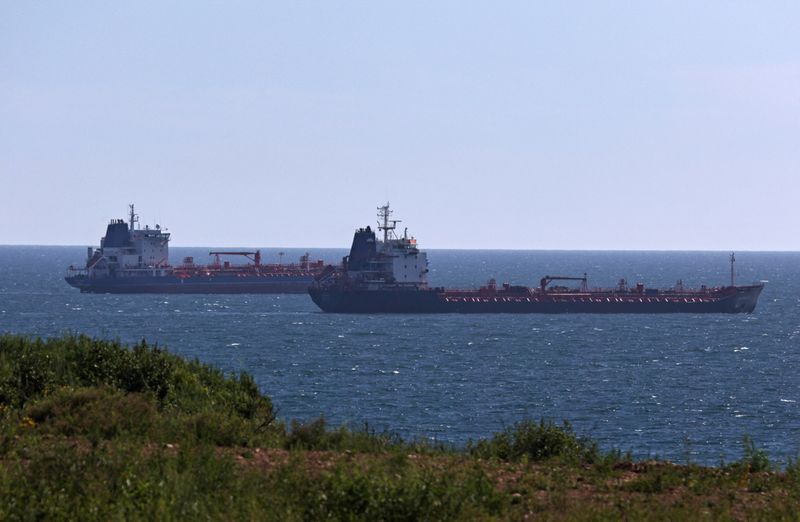(Reuters) - Russian crude oil exports to the European Union fell by 270,000 barrels per day (bpd) to 0.9 million bpd in December from the previous month, International Energy Agency (IEA) data showed.
The EU imposed a ban on maritime Russian crude oil imports from Dec. 5 and G7 countries set a price cap on Russian seaborne exports at $60 per barrel. The sanctions follow Russia's invasion of Ukraine in February 2022.
WHERE DECEMBER'S SEABORNE IMPORTS WENT
Most of December's EU-destined seaborne shipments, 160,000 bpd out of 230,000 bpd, went to Bulgaria, which has an exemption from the import ban, while one cargo went to Italy and two to the Netherlands, the IEA said in its monthly oil market report on Jan. 18.
From January, only Bulgaria can continue seaborne crude imports from Russia out of 27 EU member states, the IEA added.
HOW THE DRUZHBA PIPELINE IS AFFECTED
Exports of Russian crude via the Druzhba pipeline, which begins in Russia then splits into one branch through Belarus and Poland to Germany, and another through Ukraine to Slovakia, the Czech Republic and Hungary, are exempt from the ban.
German refineries in Leuna and Schwedt, connected to the pipeline, halted Russian crude purchases at the end of 2022.
Germany, however, plans to import about 30,000 bpd from Kazakhstan through the northern branch of Druzhba via Poland.
This means that Druzhba volumes are set to fall by 330,000 bpd to around 360,000 bpd, while Russia's share of EU crude oil imports could fall to just 5% from 27-30% pre-war levels, the IEA said.
Graphic: Russia crude oil exports to EU https://www.reuters.com/graphics/UKRAINE-CRISIS/OIL/egvbymqddpq/chart.png
WHERE RUSSIA IS SELLING ITS OIL GLOBALLY
Russian crude exports to India reached a new record high of 1.4 million bpd in December, while exports to China, including seaborne and pipeline, were broadly unchanged at 1.9 million bpd, the IEA said.
Exports to Turkey fell by 200,000 bpd to a multi-month low of 45,000 bpd. Azerbaijan's state oil firm SOCAR said last month it had stopped buying Russian crude oil for its Turkish refinery.
In December, the first crude oil cargo in seven months from Russia's Sakhalin-2 development, exempt from the G7 price cap and partly owned by Japanese trading houses, was sent to Japan.
Graphic: Russia oil exports by destination https://www.reuters.com/graphics/RUSSIA-OIL/OIL/jnpwyyxympw/chart.png
HOW THE EU IS REPLACING RUSSIAN CRUDE IMPORTS
Total Russian crude oil exports to the European Union, including seaborne exports, fell by 1.6 million bpd since last February.
The EU has been seeking to offset the decline in Russian imports by increasing supplies from the Middle East, West Africa, Norway, Brazil and Guyana, according to the IEA.
The United States and Kazakhstan could help to replace the Russian oil, the IEA said in November.
Kazakhstan has reached a preliminary deal with Moscow to supply its crude to Germany via Russia's crude pipeline network.
In December, Norway increased production capacity at Western Europe's largest oilfield, Johan Sverdrup, to 720,000 bpd from 535,000 bpd previously.
"This will be good news for European refiners as it (Sverdrup crude) is the most suitable North Sea replacement grade for Urals," the IEA said.
IMPACT ON REFINERIES
The EU's dependence on Russia crude oil imports had been underpinned by Russian companies, such as Rosneft and Lukoil, controlling some of the bloc's largest refineries.
Germany, however, has taken control of the Rosneft-owned Schwedt refinery, which supplies about 90% of Berlin's fuel needs, as well as Rosneft's minority stakes in two other refineries, MiRo and Bayernoil.
Lukoil has agreed to sell its Italian ISAB refinery to a group led by Cypriot private equity firm G.O.I. Energy, backed by Geneva-based commodity trader Trafigura, but still owns refineries in Bulgaria and Romania.
Bulgaria's parliament has cleared a way for the government to take over Lukoil's Neftochim Burgas refinery, the largest in the country, to ensure security of supplies, if needed.
The refinery is exempt from the EU crude import ban, but it cannot export its products from Feb. 5, except to Ukraine, which could force its shutdown, Lukoil has warned.
Lukoil told the government of neighbouring Romania that it had found alternative crude oil supplies and its petrol stations will not be affected by a ban on Russian imports.
In an attempt to punish Russia for the conflict in Ukraine, the European Union will also ban imports of Russian oil products, such as diesel, from Feb. 5.
